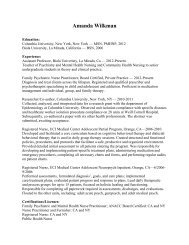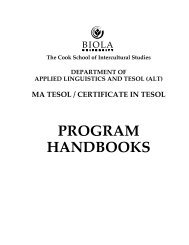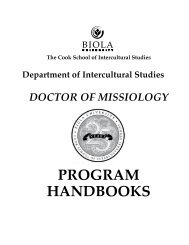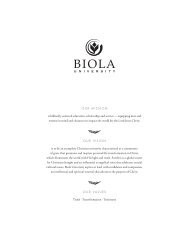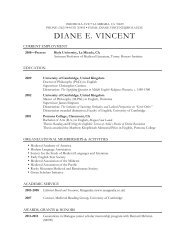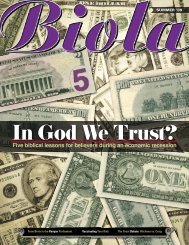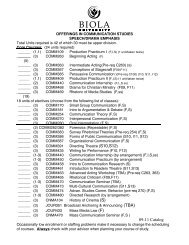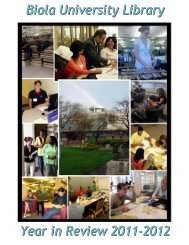Dawkins' God Delusion Divorced American ... - Biola University
Dawkins' God Delusion Divorced American ... - Biola University
Dawkins' God Delusion Divorced American ... - Biola University
Create successful ePaper yourself
Turn your PDF publications into a flip-book with our unique Google optimized e-Paper software.
In his book, Smith said, “Ego-driven people satisfy their ego from<br />
the cause, while responsibility-motivated people sacrifice their ego to<br />
the cause. Ego-drivenness lacks Christian integrity.”<br />
Cloud agrees, saying, “Ultimately, self-centeredness is what you<br />
want to protect your organization from.”<br />
In a letter to his church in Colorado Springs, Colo., Haggard<br />
admitted that “pride” kept him from seeking help for his sexual<br />
struggles and led to his fall.<br />
“When I stopped communicating about my problems, the darkness<br />
increased and finally dominated me. As a result, I did things that were<br />
contrary to everything I believe,” he said.<br />
But Cook, whom many <strong>Biola</strong>ns uphold as a model of integrity, has<br />
openly admitted times when he’s blown it. Several years ago, for<br />
example, Cook confessed that he lied to a judge during jury duty for a<br />
lengthy murder trial in Santa Ana Superior Court.<br />
The judge warned the jurors not to read anything about the case.<br />
But, a day before the trial went to jury, Cook was flipping through the<br />
newspaper and came across an article about it. Cook quickly turned the<br />
page, but then his curiosity got the best of him. He read the article,<br />
thinking nobody would find out.<br />
To his surprise, the next day the judge called the jurors, one<br />
by one, into his chambers and asked them if they had read the<br />
article. Cook — who was taken off guard and afraid to tell the truth<br />
— said, “No sir.” After he went home, however, he felt guilty and<br />
couldn’t sleep. Here he was, the president of a Christian<br />
university, and he had perjured himself. Yet, the consequences<br />
were less important to Cook than being a person of integrity. So,<br />
the next morning, he made a humbling trip back to the courthouse<br />
to tell the judge the truth.<br />
“Every step felt like I was hauling lead. Would I be put in jail? Would<br />
I be fined?” Cook thought. He had to make a confession before the<br />
judge, attorneys, defendant and courtroom reporter.<br />
“I told the judge I was a Christian, and I just had to confess my lying.<br />
I said my job depends on my relationship to <strong>God</strong> and my integrity, and<br />
that is why I am here telling you what I did,” Cook said.<br />
In the end, Cook wasn’t removed from the case and, in fact, went on<br />
to be chosen as the jury foreman.<br />
Instead of trying to hide the incident, Cook did the opposite. He<br />
wrote an article about the lessons he learned for his church’s newsletter<br />
— revealing his mistake to thousands of his fellow churchgoers.<br />
People Management looks for specific examples of integrity in<br />
candidates, like this example from Cook, according to Stevenson.<br />
Since it’s hard to know applicants’ inner motivations — whether<br />
they’re driven by ego or a desire to serve — Cloud advises hiring committees<br />
to look at how applicants have spent their time and what<br />
causes they’ve given themselves to.<br />
“Did they serve when there weren’t selfish benefits in it for them?”<br />
Cloud said.<br />
Cook recalls a time when he and Provost Gary Miller were<br />
conducting a final interview with a potential professor. The applicant<br />
BIOLA CONNECTIONS ❁ SPRING ’07 15<br />
had glowing credentials, but they didn’t hire him because they sensed he<br />
was more concerned about his own career advancement than <strong>Biola</strong>’s<br />
students. They were tipped off by the fact that the applicant — who had<br />
worked at another Christian university — had never spent time with<br />
students outside the classroom.<br />
Committees also should ask applicants if they’ve ever made hard<br />
decisions, based on their values, that cost them personally, according to<br />
Cloud. This shows if someone will put an organization’s values and<br />
mission above his or her own interests, Cloud said.<br />
Selfish motivations are grounds for compromising integrity,<br />
yet leaders are often unaware of them, according to Dr. Steve Cappa<br />
(M.A. ’90, Psy.D. ’94), another Rosemead graduate and the clinical<br />
director of Marble Retreat — a counseling center for clergy in<br />
Marble, Colo. Many of the church leaders Cappa has counseled have<br />
had an integrity lapse of some sort. Looking back, they see that false<br />
motivations were at work in them.<br />
“There’s a great capacity for self-deception in all people. It’s an<br />
extension of our fallenness,” Cappa said. “When everyone is staring at<br />
you, the leader, you’re vulnerable to feeling god-like, powerful. That’s<br />
when you start eating the forbidden fruit.”<br />
In contrast, healthy leaders have a good dose of humility,<br />
according to Cappa. “They have a sense of the magnitude and<br />
seduction of power,” he said.<br />
Mick Boersma (M.Div. ’74), for example, served as an associate<br />
pastor for four years and as a senior pastor for 11. Boersma now teaches<br />
in <strong>Biola</strong>’s seminary, Talbot School of Theology, and co-directs Talbot<br />
Support Ministries to assist about 900 alumni pastors and 450 pastorsin-training.<br />
He told <strong>Biola</strong> Connections that, as a pastor, there were times<br />
when he was in the pulpit — all eyes on him — and he became acutely<br />
aware of his influence. He believes the Holy Spirit brought this to mind<br />
so he wouldn’t abuse it.<br />
“Some pastors can certainly be tempted to be in ministry to build<br />
their own little kingdom,” Boersma said.<br />
Yet, false motivations in leaders aren’t always sinister. Dr. Judy Ten<br />
Elshof, the director of <strong>Biola</strong>’s Intentional Character Development<br />
Program, told <strong>Biola</strong> Connections that Christian leaders — like all people<br />
— need and want acceptance. And they sometimes enter leadership<br />
thinking they’ll find it there.<br />
“It can give a false sense of being loved,” she said.<br />
But they don’t see how their neediness controls them, according to<br />
Ten Elshof. And this blindness, she said, puts them at risk for failure. The<br />
Intentional Character Development Program seeks to address this by<br />
requiring all Talbot students to take part in “exercises designed to open<br />
their hearts to see the blind spots, including taking tests, receiving<br />
mentoring, and spending time alone with <strong>God</strong> for prayer and the Holy<br />
Spirit’s transforming work,” according to Ten Elshof.<br />
Finally, to get at candidates’ motivations, Cloud also tells hiring<br />
committees to listen closely during interviews. See how much time<br />
applicants spend trying to sell themselves versus how much time they<br />
spend trying to understand the organization, its values and goals.



